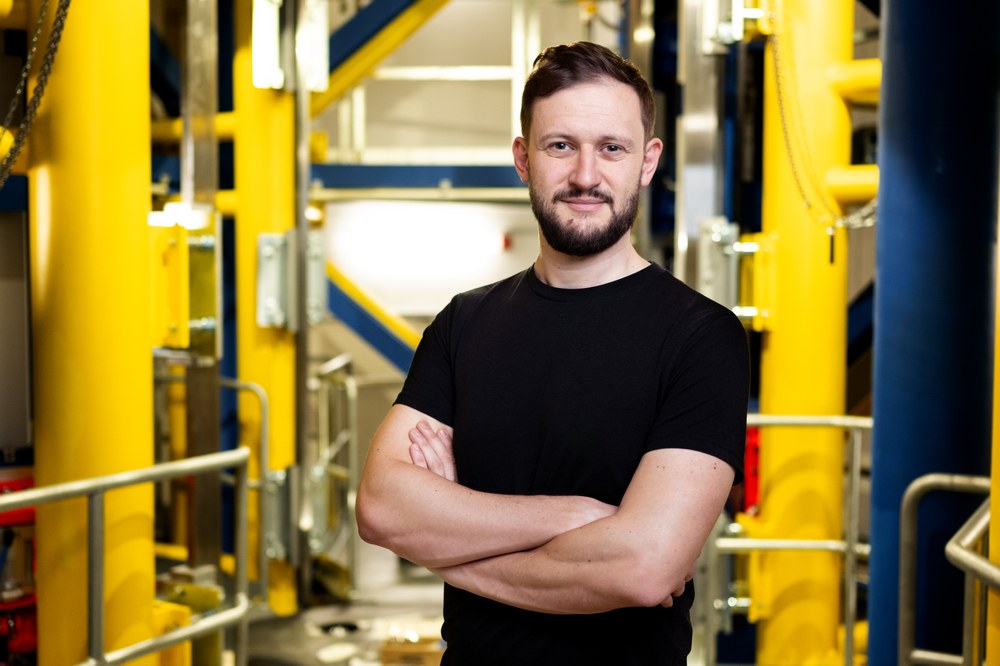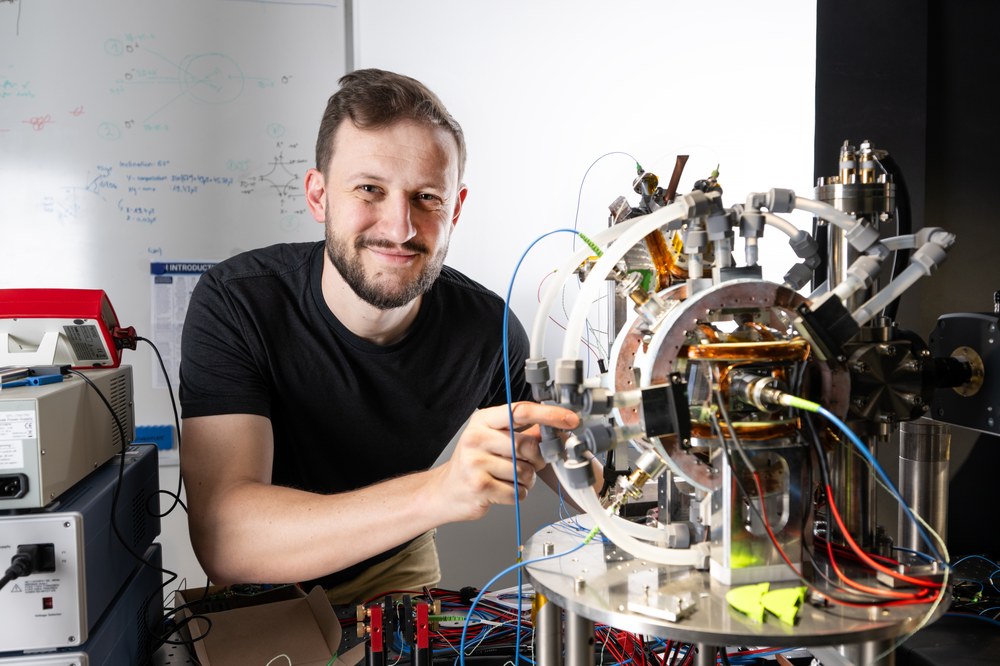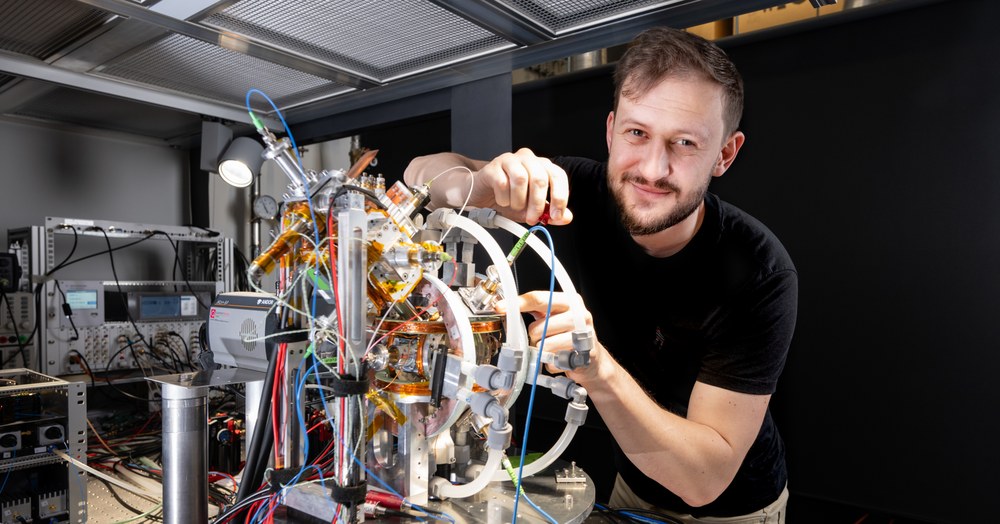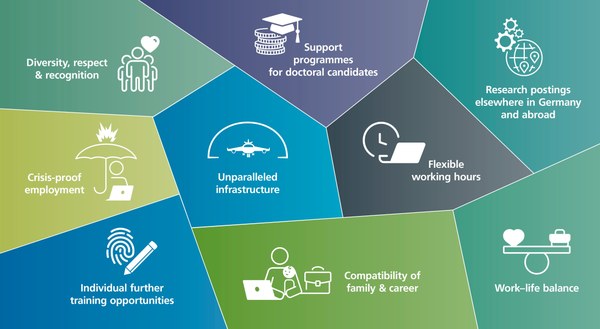Alexander Fieguth
Field of study: Physics
Now: Institute for Satellite Geodesy and Inertial Sensing
Alexander Fieguth, who holds a doctorate in Physics, joined the DLR Institute for Satellite Geodesy and Inertial Sensing in Hanover in 2023. He works in the department of Optical Frequency Metrology in the field of atomic quantum sensors.
In this interview, he provides insights into his work.
Alex, what do you look forward to when coming to work in the morning?
Alex: A variety of problems to solve. As a seasoned experimental physicist at DLR, I’m consistently faced with new issues, which means there is never a dull moment. And, of course, I always look forward to the coffee from our highly productive portafilter machine!
What are you researching or working on?
Alex: I'm primarily involved in the INTENTAS project. This project focuses on improving atomic interferometers which, for example, enable high-precision measurements of Earth's gravitational field from space. INTENTAS aims to show that so-called entanglement, a fundamental concept of quantum mechanics, can be used to improve these atomic interferometers.
„The entanglement of atoms in microgravity can be used to improve the sensitivity of atomic interferometers and atomic clocks“
Until now, the entanglement of atomic clouds has only been observed in extensive experiments conducted under highly specialised laboratory conditions. As part of the project, we are now building a new compact sensor that will use entangled atoms in microgravity for the first time. The microgravity environment is facilitated by the Einstein Elevator, a special lift in which experiments can be conducted in near microgravity (one millionth of the normal gravitational force) with a high repetition rate. This environment also imposes space and weight constraints, which we can use to test the compactness requirements of such a sensor for future satellite missions.
What does your typical working day involve?
Alex: At the moment, we are in the experimental set-up phase. This means that my working day mainly consists of laboratory tasks, whether it's tinkering with the hardware, programming software or carrying out initial measurements for calibration. In the near future, we will also be running the experiment, analysing the results in the Einstein Elevator and publishing our findings.

Where and how is your work being used?
Alex: The entanglement of atoms in microgravity can be used to improve the sensitivity of atomic interferometers and atomic clocks. These instruments can be utilized not only in research into the fundamental principles of nature, such as the precise measurement of the validity of the General Theory of Relativity or astronomy, for example, as a new way of detecting gravitational waves, but also in current and future applications. Today, atomic clocks in space and on Earth already deliver high-precision time signals, which are essential for navigation systems such as Galileo. However, the advancement of atomic interferometers could make it feasible to achieve remarkably precise navigation even without relying on satellites.
Moreover, the high-precision measurement of Earth's gravitational field is an application that will benefit from greater instrument accuracy. This can subsequently be used to improve climate forecasting models and deepen our understanding of Earth's composition.
„It's particularly fulfilling when you realise that the small parts are starting to mesh together like cogwheels and the overall project is taking shape“
Another important aspect of our work pertains to the compactness of the sensors. This will enable us to transfer the technology from the laboratory to mobile applications, such as on satellites, in ships, and more.
What are the highlights of your work?
Alex: The highlight of my work is undoubtedly when an idea we conceived in our minds or outlined on paper actually works in the real world. It's particularly fulfilling when you realise that the small parts are starting to mesh together like cogwheels and the overall project is taking shape. Of course, the realisation process rarely runs smoothly and a variety of challenges arise. But, as I mentioned earlier, this is precisely one of the most exciting parts of my job: overcoming these obstacles creatively as a team.

What special skills can you make good use of in your job?
Alex: As a trained experimental physicist, I believe that I very often make use of two skills I have learnt in my job. The first is an analytical approach to problem-solving, especially crucial when tackling complex issues with multiple potential solutions. Recognising dead ends early on and selecting efficient pathways to solutions is essential. On the other hand, a healthy dose of patience and resilience in the face of frustration is equally important, as it's likely that not a day will go by without a promising solution turning out to be a dead end.
Leave us a final thought.
Alex: While I come from a background as trained experimental physicist, I tackled entirely different challenges in my career prior to working at DLR. I believe that one should generally not be afraid to venture into new subject areas, as the skills learned in other complex contexts can often be of more value than specialised knowledge. Nevertheless, I genuinely value and appreciate the fact that the helpful and extremely competent colleagues at the DLR Institute for Satellite Geodesy and Inertial Sensing made it very easy for me to settle in.




